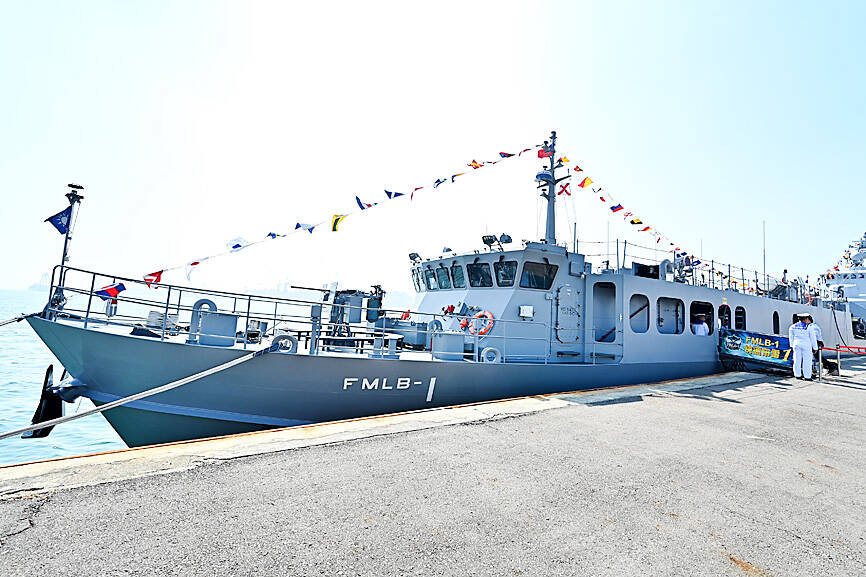The Ministry of National Defense (MND) is aiming to find a contractor next month to build six Min Jiang-class mine-laying vessels after two bids for the project were unsuccessful.
The construction of new minelayers is part of the government’s efforts to bolster the military’s asymmetric warfare capabilities.
The navy had earmarked about NT$1.8 billion (US$54.7 million) to find a Taiwanese contractor to build six Min Jiang-class minelayers from this year to 2027.

Photo: Lee Hui-chou, Taipei Times
If the project is completed, the 192nd Fleet’s mine operations squadron would have 10 Min Jiang-class minelayers three years from now alongside the four that are already in service, the ministry’s budget report showed.
The vessel, with a displacement of 376 tonnes, can be equipped with a T-75 20mm cannon at the bow and two T-74 7.62mm machine guns for defense.
Each vessel can carry between 32 and 64 domestically produced Wan Hsiang naval mines, deployed from four fixed mine rails at the midship and aft sections, with the mines capable of being released manually or through remote control within a short period, which can effectively deny and delay enemy ship’s aggression.
The ministry had organized bidding sessions on Dec. 18 last year and on Feb. 5 for part of the project, worth NT$1.548 billion. Bids were required to fulfill the contract within 20 months after the contract was signed.
One reason why the bids were not finalized is because the sessions attracted fewer than three contractors, a military source said.
Some contractors have said that the ministry should adjust the construction costs, but the ministry said it had no plan to do so.
Article 48 of the Government Procurement Act (政府採購法) stipulates that contracts cannot be awarded if the relevant authorities received less than three bids.
However, the same article also states that if the initial contract cannot proceed due to less than three tenders, a second tendering can be arranged, while the three tenders requirement would not be necessary and the time limit for such tendering may be shortened.
The ministry opened the bidding session to tender contracts for the mine-laying vessels yesterday.

A magnitude 4.9 earthquake struck off Tainan at 11:47am today, the Central Weather Administration (CWA) said. The hypocenter was 32.3km northeast of Tainan City Hall at a depth of 7.3km, CWA data showed. The intensity of the quake, which gauges the actual effect of a seismic event, measured 4 in Tainan and Chiayi County on Taiwan's seven-tier intensity scale, the data showed. The quake had an intensity of 3 in Chiayi City and County, and Yunlin County, while it was measured as 2 in Kaohsiung, Nantou County, Changhua County, Taitung County and offshore Penghu County, the data showed. There were no immediate reports of

Weather conditions across Taiwan are expected to remain stable today, but cloudy to rainy skies are expected from tomorrow onward due to increasing moisture in the atmosphere, according to the Central Weather Administration (CWA). Daytime highs today are expected to hit 25-27°C in western Taiwan and 22-24°C in the eastern counties of Yilan, Hualien, and Taitung, data on the CWA website indicated. After sunset, temperatures could drop to 16-17°C in most parts of Taiwan. For tomorrow, precipitation is likely in northern Taiwan as a cloud system moves in from China. Daytime temperatures are expected to hover around 25°C, the CWA said. Starting Monday, areas

Taiwan has recorded its first fatal case of Coxsackie B5 enterovirus in 10 years after a one-year-old boy from southern Taiwan died from complications early last month, the Centers for Disease Control (CDC) said yesterday. CDC spokesman Lo Yi-chun (羅一鈞) told a news conference that the child initially developed a fever and respiratory symptoms before experiencing seizures and loss of consciousness. The boy was diagnosed with acute encephalitis and admitted to intensive care, but his condition deteriorated rapidly, and he passed away on the sixth day of illness, Lo said. This also marks Taiwan’s third enterovirus-related death this year and the first severe

A Taiwanese software developer has created a generative artificial intelligence (AI) model to help people use AI without exposing sensitive data, project head Huang Chung-hsiao (黃崇校) said yesterday. Huang, a 55-year-old coder leading a US-based team, said that concerns over data privacy and security in popular generative AIs such as ChatGPT and DeepSeek motivated him to develop a personal AI assistant named “Mei.” One of the biggest security flaws with cloud-based algorithms is that users are required to hand over personal information to access the service, giving developers the opportunity to mine user data, he said. For this reason, many government agencies and